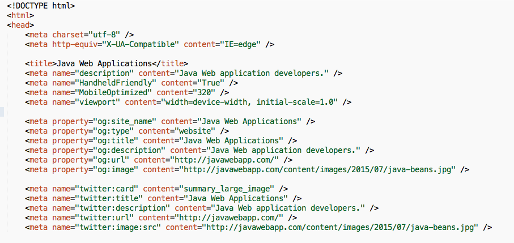
You've created a compelling website and brand, why lose impact when you try to share your content?
Having your website indexed and shared on social sharing platforms can be a powerful way to increase engagement through social media channels. One thing to be aware of are the social meta tags that should exist on your content pages.
For your website to be found and indexed properly on the social media sharing platforms, including Facebook, Google+, LinkedIn, Twitter and Pinterest, it is important to have these simple meta tags in your page's header. It will help to ensure that your website is discoverable and represented properly.
Below is a Social Media Tag Template for a Blog Article page:
<!-- Update your html tag to include the itemscope and itemtype attributes. -->
<html itemscope itemtype="https://schema.org/Article">
<!-- Place this data between the <head> tags of your website -->
<title>Page Title. Maximum length 60-70 characters</title>
<meta name="description" content="Page description. No longer than 155 characters." />
<!-- Schema.org markup for Google+ -->
<meta itemprop="name" content="The Name or Title Here">
<meta itemprop="description" content="This is the page description">
<meta itemprop="image" content="https://www.example.com/image.jpg">
<!-- Twitter Card data -->
<meta name="twitter:card" content="summary_large_image">
<meta name="twitter:site" content="@publisher_handle">
<meta name="twitter:title" content="Page Title">
<meta name="twitter:description" content="Page description less than 200 characters">
<meta name="twitter:creator" content="@author_handle">
<!-- Twitter summary card with large image must be at least 280x150px -->
<meta name="twitter:image:src" content="https://www.example.com/image.html">
The importance of Open Graph data
If you could choose only one type of meta data to include, Open Graph meta tags would be it, because all of the platforms can use it as a fallback, including Twitter to a large degree.
<!-- Open Graph data -->
<meta property="og:title" content="Title Here" />
<meta property="og:type" content="article" />
<meta property="og:url" content="https://www.example.com/" />
<meta property="og:image" content="https://example.com/image.jpg" />
<meta property="og:description" content="Description Here" />
<meta property="og:site_name" content="Site Name, i.e. Nexus Web Development" />
<meta property="article:published_time" content="2015-11-15T05:59:00+01:00" />
<meta property="article:modified_time" content="2015-11-16T19:08:47+01:00" />
<meta property="article:section" content="Article Section" />
<meta property="article:tag" content="Article Tag" />
<meta property="fb:admins" content="Facebook numberic ID" />
The meta tags above should be self explanatory. For the article:published_time and the article:modified_time, the content Time is expressed with an offset time from UTC (Coordinated Universal Time).
Example : 2015-11-05T08:15:30-05:00 corresponds to November 5, 2015, 8:15:30 am, US Eastern Standard Time.
Tools for Social Meta Tag Testing and Approval
Before your cards show on Twitter, you must first have your domain approved. Fortunately, it's a super-easy process. After you implement your cards, simply enter your sample URL into the validation tool. After checking your markup, select the "Submit for Approval" button.
You don't need prior approval for your meta information to show on Facebook, but their debugging tool provides a wealth of information about your meta tags and can analyze your Twitter tags as well.
C. Google Structured Data Testing Tool
Webmasters typically use the structured data testing tool to test authorship markup and preview how snippets will appear in search results, but you can also use see what other types of meta data Google is able to extract from each page.
D. Pinterest Rich Pins Validator
Like Twitter, Pinterest requires an approval process to enable Rich Pin functionality. Use the Rich Pin Validator tool to test your data markup and apply for approval at the same time.
These social meta tags can go a long way towards enhancing your site's visibility on social platforms. On WordPress sites, they can be implemented automatically by some plugins.
Sharing is caring:
DIGITAL-MARKETING
digital marketing social meta tags